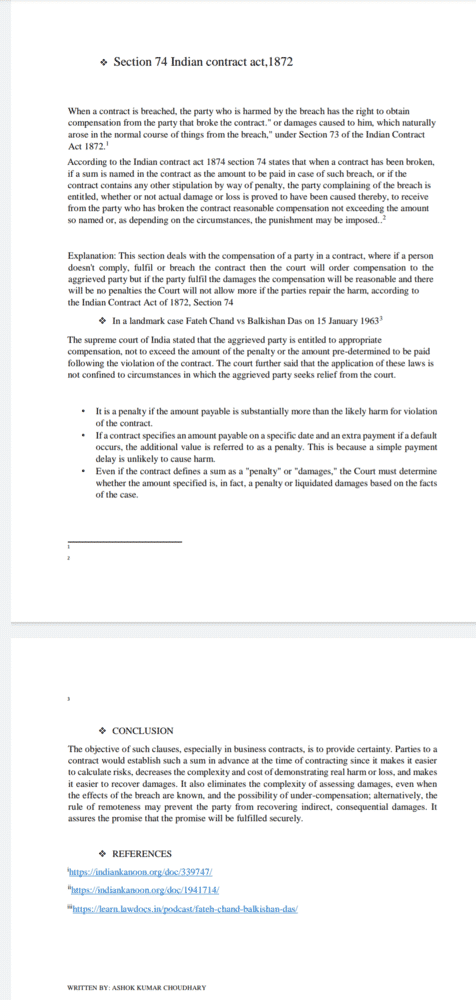Table of Contents
Section 74 Indian contract act,1872
“When a contract is breached, the party that suffers damages is entitled to recompense from the person who broke the contract caused to him, which naturally arose in the normal course of things from the breach,” under Section 73 of the Indian Contract Act 1872.1
According to the Indian contract act 1874 section 74 states that when a contract has been broken, if a sum is named in the contract as the amount to be paid in case of such breach, or if the contract contains any other penalty stipulation, the party complaining of the breach is entitled to receive from the party who has broken the contract reasonable compensation not exceeding the amount so named or, as the case may be, the penalty stipulated for whether or not actual damage or loss is proven to have been caused.2
In case of such breach, or if the contract contains any other penalty, the party complaining of the breach is entitled to receive from the party who has broken the contract reasonable compensation not exceeding the amount so named or, as the case may be, the penalty stipulated for, whether or not actual damage is proven.
Section 74 of the Indian Contract Act 1872.
In a landmark case Fateh Chand vs Balkishan Das on 15 January 19633
The supreme court of India stated that the aggrieved party is entitled to appropriate compensation, not to exceed the amount of the penalty or the amount pre-determined to be paid following the violation of the contract. The court further said that the application of these laws is not confined to circumstances in which the aggrieved party seeks relief from the court.
- It is a penalty if the amount payable is substantially more than the likely harm for violation of the contract.
- If a contract specifies an amount payable on a specific date and an extra payment if a default occurs, the additional value is referred to as a penalty. This is because a simple payment delay is unlikely to cause harm.
- Even if the contract defines a sum as a “penalty” or “damages,” the Court must determine whether the amount specified is, in fact, a penalty or liquidated damages based on the facts of the case.
CONCLUSION
The objective of such clauses, especially in business contracts, is to provide certainty. Parties to a contract would establish such a sum in advance at the time of contracting, since it makes it easier to calculate risks; decreases the complexity and cost of demonstrating real harm or loss, and makes it easier to recover damages. It also eliminates the complexity of assessing damages, even when the effects of the breach are known, and the possibility of under-compensation; alternatively, the rule of remoteness may prevent the party from recovering indirect, consequential damages. It assures the promise that the promise will be fulfilled securely.
REFERENCES
ihttps://indiankanoon.org/doc/339747/ iihttps://indiankanoon.org/doc/1941714/
iiihttps://learn.lawdocs.in/podcast/fateh-chand-balkishan-das/
Author: Ashok choudhary,
Indore Institute of Law/ LLB HONR.


feel free to contact me for any queries at ashokchoudahry042@gmai.com